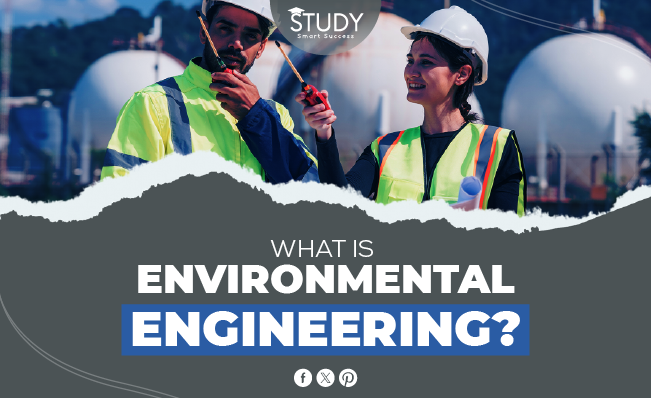Environmental sustainability and climate change are top worldwide concerns, and environmental engineering is essential to finding answers. Whether you’re an environmental scientist, civil engineer, or eco-conscious consumer, knowing environmental engineering may help us move toward a better future.
Understanding Environmental Engineering
Environmental engineering uses engineering, ecology, chemistry, and biology to solve ecological problems. Challenges include pollution control, waste management, sustainable development, and resource conservation. Environmental engineers reduce human impacts to benefit the environment and public health.
Critical Areas of Environmental Engineering
Environmental engineering has numerous important disciplines that concentrate on ecological preservation and sustainability. Here are some key areas:
Water and Wastewater Treatment:
Environmental engineers create and manage water and wastewater treatment systems for human and environmental safety. This involves filtration system development, sewage treatment plant management, and environmental compliance.
Air Quality Management:
Urban air pollution is a significant issue. Environmental engineers monitor and minimize air pollution by regulating industrial and automobile emissions using scrubbers, filters, and catalytic converters.
Solid Waste Management:
Preventing pollution and saving resources requires proper solid waste disposal. Environmental engineers design eco-friendly recycling, composting, and landfilling systems.
Environmental Impact Assessment:
An environmental effect study (EIA) is done before any significant building project, such as a power plant or a highway. Environmental engineers examine the project’s possible environmental effects and suggest ways to reduce adverse effects.
Sustainable Development:
Environmental engineers are at the forefront of pushing for methods of healthy growth. This means making places better for the environment, finding clean energy sources, and using strategies that lower carbon emissions and protect natural resources.
Soil and Groundwater Remediation:
Soil and groundwater contamination endangers human health and the environment. It cleans up polluted locations using bioremediation, soil washing, and in-situ chemical oxidation.
Environmental Policy and Regulation:
Environmentally sound rules and laws are needed. Ecological laws must be shaped to ensure they are scientifically sound and enforced. This involves government agency advice, environmental standard development, and policy lobbying.
Renewable Energy Systems:
Environmental engineers develop and deploy renewable energy solutions to decrease fossil fuel use. Sustainable energy options that minimize greenhouse gas emissions employ solar, wind, hydropower, and geothermal energy.
Climate Change Mitigation and Adaptation:
One of our most significant issues is climate change. Environmental engineers must reduce greenhouse gas emissions and create adaptation techniques to combat them. This may require robust infrastructure, carbon capture and storage improvements, and severe weather early warning systems.
Noise Pollution Control:
Noise pollution can be harmful to people’s health and well-being. Environmental engineers who build noise barriers, enforce noise control laws, and develop quieter machines and methods for industry can lessen noise pollution.
The Importance of Environmental Engineering
It’s impossible to say enough about how crucial environmental engineering is. This field is essential for the following reasons:
-
Public Health:
Environmental engineers keep people healthy by ensuring clean air, water, and land. Polluted air or water sources can cause several health issues, such as lung diseases and illnesses that are spread through water.
-
Ecosystem Protection:
Environmental engineers protect environments and places that are already there. This includes reducing the damage caused by cutting down trees, keeping alien species in check, and fixing damaged environments.
-
Regulatory Compliance:
Environmental engineers help businesses and cities follow ecological rules. This lowers the risk of getting fined and encourages environmentally friendly habits.
-
Climate Change Mitigation:
Environmental engineers are critical in stopping climate change and lowering greenhouse gas pollution. They develop new ideas like renewable energy systems and carbon capture technologies.
-
Economic Benefits:
Environmentally friendly activities and technology may boost the economy. Environmental engineers decrease waste and energy use, saving enterprises money. Green technology development and implementation may stimulate economic growth and employment creation.
-
Sustainable Urban Development:
Environmental engineers design and build sustainable cities. This involves creating environmentally friendly public transit, green areas, and urban infrastructure. These activities improve urban people’s quality of life and living conditions.
-
Innovation and Research:
Innovation drives environmental engineering. Engineers continuously create new technologies and methods to handle environmental issues. This study promotes science and technology while creating cleaner, more sustainable solutions.
-
Emergency Response and Recovery:
Environmental engineers are vital to disaster recovery after natural or industrial catastrophes. They analyze environmental damage, plan cleanups, and avoid similar events. Their skills depend on effective and ecologically friendly rehabilitation initiatives.
-
Community Education and Engagement:
These professionals teach communities about sustainability and environmental protection. They enable people and communities to safeguard the environment via workshops, seminars, and outreach. A sustainable culture requires grassroots engagement.
How to Become an Environmental Engineer
If you love environmental issues and wish to work in environmental engineering, follow these steps:
Educational Background:
Get a bachelor’s degree in environmental engineering, civil engineering, chemical engineering, or environmental science. Fluid mechanics, hydrology, environmental chemistry, and microbiology are standard courses.
Gain Experience:
You can get real-world training in the field through internships and co-op programs. Check out tech companies, government bodies, and environmental groups for job openings.
Licensing and Certification:
Many jobs demand licensed environmental engineers. Pass the Fundamentals of Engineering (FE) exam, get the necessary professional experience, and pass the PE test. LEED certification may also boost your qualifications.
Advanced Studies:
A master’s or Ph.D. in environmental engineering or a related field can lead to better job chances and research roles, but it’s not always required.
Skills Development:
Learn crucial environmental engineering skills. Assessing ecological challenges and finding solutions requires critical thinking, problem-solving, and analysis. Experience with GIS and CAD applications might also be helpful.
Networking:
Building a professional network is critical. Join ASCE or NSPE. Attend conferences, workshops, and seminars to connect with industry experts and learn about new trends and technology.
Stay Informed:
Environmental engineering research and development must be followed. To keep up with new trends, laws, and technology, read industry journals, follow credible environmental news sources, and attend continuing education seminars.
Ethical Practices:
Be ethical in your career. Environmental engineers must make moral judgments to preserve public health and the environment. A code of ethics ensures ethical and sustainable engineering.
Communication Skills:
Improve your writing and spoken communication. Environmental engineers must explain brutal technical facts to non-engineers, legislators, and the public. Collaboration, reporting, and advocacy need good communication.
Multidisciplinary Approach:
Be transdisciplinary in your education and practice. Environmental engineering intersects with biology, chemistry, geology, and urban planning. Understanding and using these disciplines may help you solve complicated ecological concerns.
Fieldwork and Research:
Combine classroom learning with fieldwork and research. Field investigations, laboratory research, and on-site evaluations give practical information and insights to comprehend environmental phenomena and engineering solutions.
Follow these steps and keep learning to establish a meaningful career in environmental engineering that helps preserve and enhance our natural environment.
Conclusion
Environmental engineering is an exciting discipline that addresses today’s most critical environmental challenges. Combining engineering and ecology helps build a sustainable and healthy world. Understanding environmental engineering’s breadth and importance may encourage you to contribute to this vital field, whether you’re an environmental scientist, civil engineer, or eco-conscious consumer.


